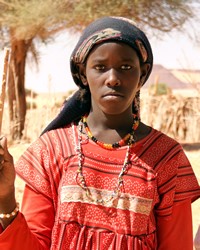Tubu, Teda in Chad

Photo Source:
Anonymous
|
Send Joshua Project a map of this people group.
|
| People Name: | Tubu, Teda |
| Country: | Chad |
| 10/40 Window: | Yes |
| Population: | 112,000 |
| World Population: | 160,600 |
| Primary Language: | Tedaga |
| Primary Religion: | Islam |
| Christian Adherents: | 0.00 % |
| Evangelicals: | 0.00 % |
| Scripture: | Translation Needed |
| Ministry Resources: | No |
| Jesus Film: | No |
| Audio Recordings: | Yes |
| People Cluster: | Kanuri-Saharan |
| Affinity Bloc: | Sub-Saharan Peoples |
| Progress Level: |
|
Introduction / History
The Tubu (or Toubou) are called the "black nomads of the Sahara." Most of them live and roam the Tibesti Mountains of northern Chad and southern Libya. All Tubu men consider themselves warriors. Warfare, fights between clans, and revenge killings are part of Tubu culture and history. The Tubu are famous for their raiding of caravans and for taking and selling slaves.
There are three castes in Tubu society. The freemen own herds of animals and land, artisans, and slaves. Freemen do not marry persons in the artisan caste because they view them as inferior in status.
The Tubu live in the Sahel Desert states of Sudan, Chad, Niger and Mali. There is also a small population in Nigeria. They have two subgroups: the Teda and the Dazagra.
What Are Their Lives Like?
Artisan Tubu live in circular wooden houses with palm-thatched roofs. These artisans also farm near oases. Dates, peanuts and grains are their chief crops. The artisans also mine and sell salt and natron, sodium carbonate, a substance used in many areas of the economy. Artisans make goat hide tents and do metal and woodwork.
Livestock is the major source of income for most of the Tubu people. They determine their amount of wealth by the number of camels or goats one owns. There are frequent feuds over pastureland and wells. Men take care of camels, hunt, and trade with other clans. Women take care of children, the home, and goats. Women make clothing and gather wild fruits and roots after the rainy season. Nomadic Tubu live in goatskin tents when they are following their herds.
Clans arrange marriages with the consent of the young people. A family must pay a bride price in livestock to the clan of the young woman.
In a shame-based society like the Tubu, a man would prefer death to see his family or clan disgraced. Violence, fighting, stealing and revenge killings are regular parts of Tubu life. Only the Lord can change people from the inside.
The Tubu people have an oral culture. Few have literacy skills. Some boys attend Muslim schools for a few years to learn the Koran and Arabic. They learn by chanting and other oral methods.
What Are Their Beliefs?
The Tubu became Sunni Muslims in the 18th century. They keep many of their animist beliefs in their practice of Islam. Sunnis try to obey the teachings of the Koran and the prophet Mohammad. Sunnis believe that by following the Five Pillars of Islam that they will attain heaven when they die. However, Allah, the supreme God of the universe, determines who enters paradise. Sunnis pray five times a day facing Mecca. They fast the month of Ramadan. They attend mosque services on Friday. If a Tubu has the means, he or she will make a pilgrimage to Mecca once in his or her lifetime. Orthodox Sunni Muslims must refrain from eating pork, gambling, deceiving, slandering, and making idols.
The two major holidays for Sunni Muslims are Eid al Fitr, the breaking of the monthly fast and Eid al Adha, the celebration of Abraham's willingness to sacrifice his son to Allah.
What Are Their Needs?
The Tubu have both spiritual and physical needs. They need a regular source of water for their animals which new wells could provide. Radio programs in the Tedaga language could introduce the Tubu to their Savior. Medical teams can bring modern medicine to the Tubu. Their children need to learn literacy skills to take part in the 21st century economy.
Prayer Points
Ask the Lord to raise up additional Christian workers to join the few who are already working among the Tubu of Chad.
Ask the Holy Spirit to grant wisdom and favor to mission agencies focusing on the Tubu.
Pray the Lord sends Christian teachers to the Tubu to teach them and their children literacy skills.
Pray that a strong network of local churches will be raised up by the Holy spirit among the Tubu.
Ask the Lord to bring a just and lasting peace to Chad.